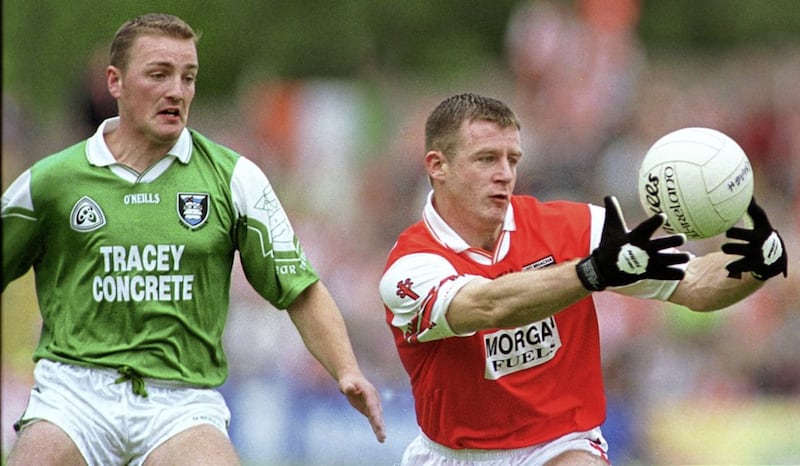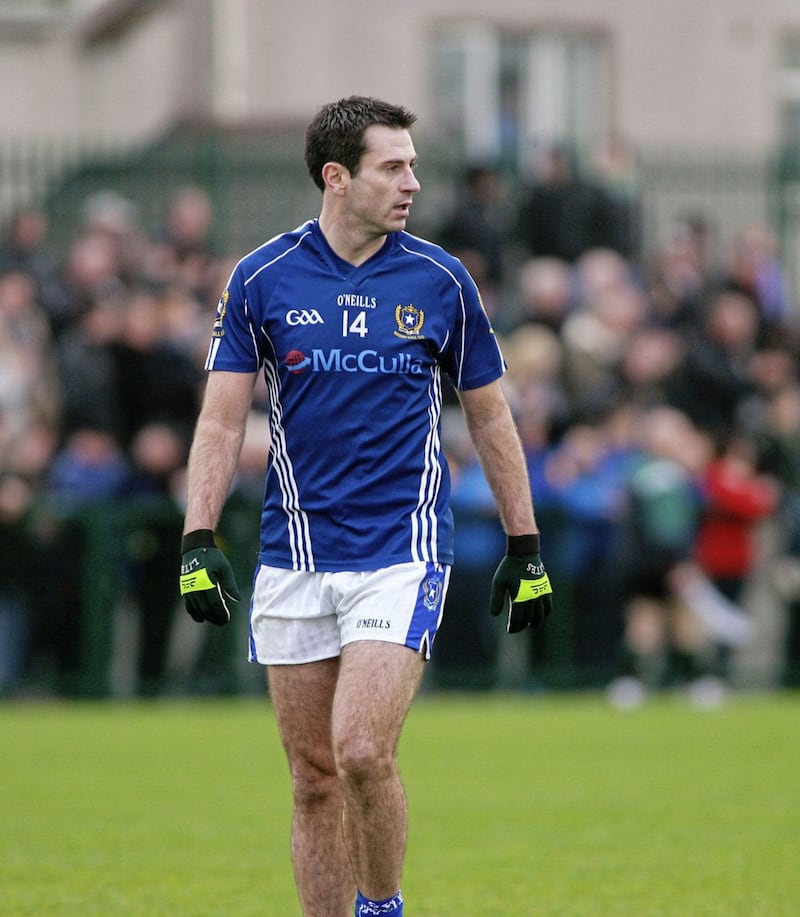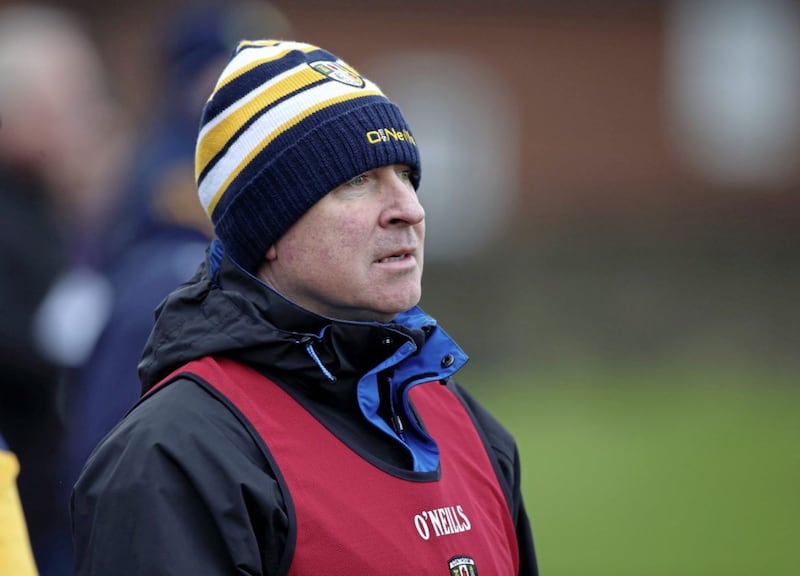‘ABSOLUTELY sensational, obviously the major difference between the two sides. Rory Gallagher’s tally of 3-9 accurately reflects a wonderful personal display, even though two of his goals were from the penalty spot. Converted those calmly, one to each corner, and added four frees, plus an amazing long range ‘45’ against the breeze in the first half. Two of his points were also splendid efforts struck off his supposedly weaker left foot as the Erne Gael showed off his entire repertoire of tricks, capped off with a fisted goal at the end. It was his move back deeper to influence play that turned the match in his favour, illustrating his well-known capabilities as a playmaker. However, the 24- year-old also ably demonstrated that he can be effective on the square too, proving too much of a handful for Monaghan skipper Dermot McDermott and Gary McQuaid too when he was moved onto him. Player rating: 9.75’
– Irish News player rating versus Monaghan, Monday May 13, 2002
HE’LL spit on his hands a thousand times and swig from a water bottle almost as much. In between swigging and spitting and dousing his hair in water, he’ll gulder onto the field like a man possessed from the first minute to the last, directing physios and assistants as he goes.
He’ll move Ethan Doherty a yard left and Paudie McGrogan a yard right. This is new wave control freakery.
“It was tough on my mum and dad. I knew I was self-destructing. And I also knew the next phase of that, if I had carried on, it was not being here. I was in a very dark place...” - the life and times of Caolan Mooney
“I felt as if the world was going to end...” St Colman’s College sports studies students submit articles on the game, fight or issue that mattered most to them this year…
For the opposition, he’s the hornet that never goes away.
Sitting on the Donegal bench in Clones in the early stages of the Ulster final, Hugh McFadden was incandescent with rage at his former manager’s perceived trespassing into the opposition’s side-line space and occasional pieces of commentary.
Rory Gallagher is the kind of man who gets under your skin so adeptly during a game, and somehow never loses his own focus.
As Armagh collapsed under the pressure against his Fermanagh side in 2018, you sensed Kieran McGeeney summoning all the self-discipline not to bite back at the Belleek native.
In Healy Park earlier this year, Gallagher was like a Jack-in-the-box, spitting out more water and instructions than seemed humanly possible, with match official Maggie Farrelly cautioning him a couple of times.
“No sweeper, no sweeper!” he shouted onto the pitch at The Athletic Grounds as Derry ran over the top of Monaghan.
Former Fermanagh team-mate Shane King recalls: “We were playing against Armagh in the National League and Armagh were attacking with ball in hand; the ball came to Jarlath Burns and Rory ran up beside him and called for the ball, and Jarlath almost passed it to him before realising…
“When some players are vocal they lose concentration but you couldn’t talk Rory out of a game. He’d such wit on the field… He used to make jokes that if there was no training and it was just down to skill he’d be even better!
“If you were managing against him, you couldn’t get involved with him because he’d distract you. But Rory must be one of the most misunderstood people in the GAA. He has that kind of Martin O’Neill passion on the side-line, but he’s nobody’s fool.”
***************
IN the aftermath of Derry’s dramatic capture of the Anglo-Celt Cup in May – their first since 1998 – Dom Corrigan sent his former St Michael’s student a text: ‘You’re more popular in Derry now, Rory, than back in ’92 when we were beating Maghera!’
“You knew Rory was one of these lads who didn’t start playing football when he came to St Michael’s College. He grew up in those early years with the ball in hand. He had a fantastic skillset, a great footballing brain,” Corrigan says.
Under his tutelage, Gallagher was a key member of the St Michael’s team that won back-to-back Corn na nOg titles in 1992 and ’93.
Heavily tipped to scoop the Rannafast Cup the following year, the Enniskillen-based students were flying.
“We got through to the Rannafast final,” Corrigan recalls. “We were in super shape and looked like we’d do it. We were maybe two weeks out from the final and I took the squad for an overnight camp down to St Patrick’s Navan and played a match. We blitzed St Pat’s Navan but Rory came off with an injury and it turned out he had a hairline fracture on his ankle.
“He missed the Rannafast final and we lost to Maghera. So, it shows you he was very much an integral part of the team.”
That was the last time Corrigan managed Gallagher until they were reacquainted at the Fermanagh seniors.
“Rory could see things on the pitch that others couldn’t,” Corrigan adds. “As a 13-year-old, he was unmarkable. He was brilliant to work with at that stage. I look back on that team of 92 and 93, they were a great group of lads, great footballers and Rory was that marquee talent.”
Up until he suffered a groin injury in his late teens, King was mesmerised by Gallagher’s distance kicking at underage level.
“He could point ‘45s at U14 level and was probably as good a dead ball striker there ever was. Before the groin injury he would have been hitting balls over from 70 yards,” says King, four years Gallagher’s senior.
“He racked up some big scores but his passing was the thing that stood out for me.”

During the late 90s and early 2000s, the Ernemen had three maverick forwards in their ranks: King and cousins Raymie and Rory Gallagher.
“Rory would be the first to admit that he didn’t love the toughest training sessions but his movement was very good. I loved playing with him. There was Raymond, Rory and me in the full-forward line. Rory could drift out to half-forward and pick you out every time.”
While an Ulster title would always prove elusive in Fermanagh, it didn’t stop Gallagher topping the scoring charts three years running (2000, 2001 and 2002).
His whopping 3-9 tally against Monaghan in the '02 provincial series remains a record scoring tally high from any player in an Ulster Championship game.
In ’03, he was working in Dublin and transferred to St Brigid’s in the capital where Raymie was also playing.
During that period, speculation intensified about him lining out for the Dublin footballers but it never came to fruition.
“I think it will be a long time before Dublin accept recognised inter-county footballers into our county to try and help us win the All-Ireland,” Dubs boss Tommy Lyons said in December 2002. “It would be a shallow title as far as I’m concerned.”
It was during those nomadic years Gallagher missed the best of times with his native Fermanagh.
He didn’t feature during the Ernemen’s brilliant run to the 2003 All-Ireland quarter-finals and probably more agonising for one of the best players to ever emerge from the county, Gallagher wasn’t part of Charlie Mulgrew’s unlikely heroes that reached the All-Ireland semi-finals the following summer.
He returned briefly to the Fermanagh set-up in 2005.
There was still a kick in Fermanagh when Malachy O’Rourke guided them to the 2008 Ulster final, only to lose to Armagh after a replay.
Had Fermanagh the free-taking expertise of Gallagher that summer – a glaring problem for the side - few would have bet against them winning their first-ever Anglo-Celt title, and Armagh most certainly wouldn’t have escaped with a draw that first day.
In between Fermanagh’s halcyon days, Gallagher lined out for the Cavan footballers under Donal Keogan.
Timing was one of his greatest assets on the field, but it wasn’t with Fermanagh in the early-to-mid-Noughties.
Still, all the while he was adding to his own football education in Dublin and Cavan before moving to Belfast where he won an All-Ireland Club title with Falls Road club St Gall’s.
Despite suffering final heartbreak in ’06 to Salthill-Knocknacarra, the Milltown men hadn’t given up on their All-Ireland dream and reached the Holy Grail in 2010.
Gallagher, who was working in recruitment at the time, had moved branches from Dublin to Belfast and with his brother Ronan keeping goal at Milltown, St Gall’s seemed the ideal move.
“I suppose at that particular time a few things came together,” says All-Ireland winning manager Lenny Harbinson.
“We had a maturing squad that had lost an All-Ireland in 2006 and was still winning Antrim Championships, and you had Rory coming in who was an experienced, quality player.”
Gallagher proved decisive in several big Championship matches for St Gall’s as they went on to beat Kilmurry-Ibrickane of Clare in the All-Ireland decider in Croke Park on St Patrick’s Day, 2010 – none more so than his two-goal salvo to recover victory against Clontibret in the Ulster semi-finals.
“It was nip and tuck and Conor McManus missed a goal opportunity for Clontibret, but Rory was managing to bring other forwards into the game, the likes of CJ [McGourty] and Kevin Niblock, and they were doing a lot of scoring.
“He just gave other players direction and give us a different dynamic.”
“As well as his talent, Rory was very cerebral in how he approached the game,” says Mark McCrory, who was part of that all-conquering St Gall’s side. “His awareness, how he moved, how he brought other players into the game, that’s what he brought to us above all.
“He did it for years down in Fermanagh where his scoring statistics were something else. When he was with us he brought organisation that we maybe just didn’t have at that point. All of a sudden the six-man forward line gelled much better.”

Gallagher played for the Belfast club for a couple of seasons before hooking up with Jim McGuinness and starting a revolution in Donegal.
“When we had the likes of big Mark McCrory joining us or John Rafferty, all of a sudden one or two new faces can give the place a lift.
“It’s hard to actually quantify but Rory coming in gave us a lift and probably gave us that extra three or four percent that perhaps didn’t necessarily win us the All-Ireland but it was a contributing factor.”
He wasn’t overly opinionated but Harbinson and Gallagher spoke more regularly during his second season and he still managed to play Championship football for St Gall’s in 2011 while assisting McGuinness up in Donegal.
“We’d a quite a few players in that St Gall’s team who certainly weren’t quiet,” McCrory adds.
“Rory would have had to be very animated to stand out in that crowd! He was intense, he wasn’t shy, you knew there was an experienced confidence about him. When he came to us we knew he was going to help us win an All-Ireland.”
*****************
FOR a couple of incredible years, McGuinness and Gallagher were joined at the hip, at least when you saw them together on the Donegal side-lines.
According to Eamon McGee, Gallagher was part of a “perfect triumvirate” – the other members obviously being Jim McGuinness and Michael Murphy who guided Donegal to a dramatic All-Ireland win in 2012.
“I don’t think we would have won it without one of those three,” says McGee, a key cog in Donegal’s All-Ireland win.
“I think we might have won it at some stage but Rory was so important to Donegal… I loved Rory, personally. Jim was going with the young fellas in terms of that U21 squad – and Rory pitched for me.
“I was blown away by his knowledge. He’s just totally obsessed with the game, it’s scary. He just loves GAA. To get to that level I think you have to be of that obsessive nature.”
Once they achieved the ultimate goal, the relationship between McGuinness and Gallagher fell apart in 2013. McGuinness insists he jettisoned both Gallagher and Maxi Curran; Gallagher and Curran say they quit.
When McGuinness departed after losing the 2014 All-Ireland final to Kerry, the players wanted Gallagher as their manager.
“As players, and I don’t know if it was the right thing to do, but we more or less said we wanted Rory in and we weren’t going to accept anybody else,” McGee says.
Gallagher wanted to the transition process to begin earlier, while McGuinness still felt there was more left in some of the old guard.
By the time Gallagher took the reins in 2015, the “older players were too old and the younger players were too young” was how one observer put it.
Still, they could easily have pocketed a couple of Ulster titles but let them slip to Monaghan (2015) and Tyrone (2016).
“Rory wanted to start the transition after they’d won the All-Ireland,” says Shane King, “but with any team if you start the transition a bit too late it takes twice as long. I think Donegal’s starting grid could have been rotated a bit more [under McGuinness]... There was a lot of stuff in the media about what had happened between Rory and Jim and the disagreements. It was untenable for Rory at that stage.”
Gallagher stepped down following Donegal’s heavy Championship defeat to Galway in 2017, but many believed the Belleek man should have got more support from county officialdom at the time and been allowed to rebuild the senior team.
“I know it was only the start of his journey but Rory had an awful lot to learn, and listening to the Derry lads he’s come on a good, good bit, even listening to Rory himself,” McGee adds.
“You have to remember a lot of those 2012 players were coming to the end when Rory took over, and Rory knew that. He came out publicly and said it was going to be difficult and that he was going to have to make that transition and more or less retire some of the 2012 players. The squad was ageing and on the way down and Rory still had a good bit to learn.”
However, even allowing for the lessons Gallagher still had to learn in making a transition of his own, Donegal’s loss has been Derry’s gain.
“Donegal haven’t developed the way they should have developed,” says Harbinson. “They wouldn’t have gone backwards if Rory Gallagher had still been there.”
After raising standards in his native Fermanagh, conditions were ripe for another revolution in Derry.
With an Ulster title already banked and an All-Ireland semi-final against Galway to ponder, Rory Gallagher is on the cusp of something great again.
Only this time it's on his terms...
****Can Derry win the All-Ireland?****
“In the Ulster final they won a game of chess and I think what you saw against Clare was Derry playing on the front foot and using all of their assets. They showed that they can go for the jugular in a significant game. Once they did that then they are serious contenders.
“It seems to me Derry have the players to do it and have the ability to react to whatever happens in a game, that they’re not just a one-trick pony playing a certain way because I don’t think you win an All-Ireland if you just play defensive football. They’re a team that looks as if it has all the talent, athleticism and the ability to play in a number of different tactical ways.” – Former Antrim, Armagh and St Gall’s midfielder Mark McCrory
“I don’t honestly think they can win an All-Ireland. I definitely think they can beat Galway but whoever comes out of the other semi-final I think will win it. But their journey and trajectory is so similar to where we were in 2012. People said: ‘Could they beat Kerry in the quarter-final? No. Could they beat Cork? No. Sure Mayo will beat them in the final…’”
– Donegal’s 2012 All-Ireland winner Eamon McGee
“Yes, they could but I don’t think they will, and the reason is the likes of Dublin and Kerry have so much experience of playing big games at Croke Park. I think Dublin will reach the final and if Derry do as well imagine coming into that environment; nothing prepares you for that if you haven’t been there before. Dublin or Kerry have four or five scoring threats and all of a sudden you need another one or two of Chrissy McKaigues or Brendan Rodgers.”
– St Gall’s 2010 All-Ireland winning manager Lenny Harbinson

“I think they can win it. They’ve got the pace, the energy, the intelligence and their style will suit Croke Park. They showed against Clare they are adaptable to it. Anyone of the four teams left can win it. Derry have as good a chance as any.”
– Former Fermanagh manager Dom Corrigan
“I think they can get over Galway and if they do they will make it very, very ugly for whoever they play in the final. The way Derry play they can hammer you by a point. These Derry players are prepared to die for each other.”
– former Fermanagh player Shane King





